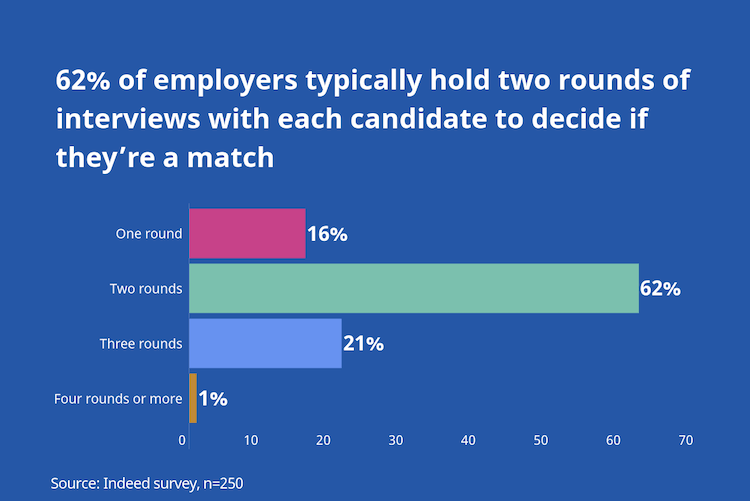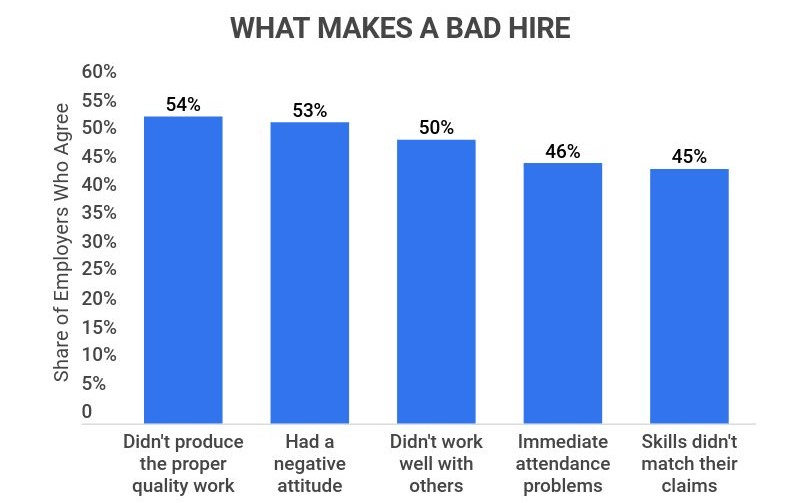Essential Strategic Interview Questions To Ask Job Candidates
Looking for top talent? Learn why strategic interview questions are important for hiring and find out 11 essential questions to ask candidates in your next interview.

As an interviewer, it can be tough to know what specific questions to ask job applicants. Like any position, becoming a great interviewer takes practice, especially if you’re unsure what questions to put forward.
While we’ve all asked “what are your weaknesses” to potential candidates, this may not be the best avenue to evaluate previous behaviors, problem-solving abilities, strengths, and aspirations. Especially as most candidates respond with the always believable “if anything, I work too hard.”
That’s why asking questions that focus on behavioral, situational, and goal-orientated factors ensures a better understanding of whether a candidate is the right fit for your team. Here’s where strategic interview questions come into play.
And to make interview prep easier, 4 Day Week comes to the rescue. With our expertise in the job market, we’ll outline nine essential strategic interview questions to help you identify the best candidate. Let’s get started!
What are strategic interview questions?
Strategic interview questions assess your candidate’s ability to think critically, solve problems, and make decisions. Rather than following the traditional route of focussing on potential employee's qualifications and experience, strategic questions go one step further.

Strategic questions reveal a deeper understanding of a candidate instead of surface-level information. Hiring candidates on superficial insight is a surefire way of taking on a bad hire.
As mentioned earlier, there are three types of strategic interview questions you should consider:
- Behavioral questions - behavioral interview questions delve into your candidate’s past behavior at a job, to understand their compatibility.
- Situational questions - situational questions explore problem-solving skills and if your candidate can handle day-to-day scenarios.
- Goal-oriented questions - goal-oriented questions analyze future career aspirations. These queries are geared toward leadership roles within your organization.
Why strategic interview questions are important
We all know a strong company culture goes hand-in-hand with increased job satisfaction and performance. Thankfully, one effective way to ensure that you find the right candidate for business is by utilizing strategic interview questions.
And with research showing the cost of hiring the wrong employee can reach as high as $240,000, securing the best candidate will protect your bottom line.

If you’re still on the fence about using strategic interview questions in your hiring strategy, let’s take a look at some other critical selling points:
1. Identify the best candidate for the role
By asking questions tailored to the role and its responsibilities, you’ll gain valuable insight into your candidate’s motivations and potential fit. It’s also an opportunity to delve into specific questions that paint a clearer picture of your candidate's abilities.
2. Identify candidates who can develop an efficient strategy
Strategic interview questions offer candidates a chance to demonstrate strategic thinking abilities. These questions help assess if candidates can think ahead and plan for the future. Successful candidates are more likely to turn a possibility into a doable action.
Essentially, it's the perfect opportunity for applicants to identify risks within the role and offer solutions. Presenting efficient strategies will set candidates apart from others as their problem-solving skills will put them at the front of the pack.
3. Ensure fairness and objectivity in the hiring process
By asking the same strategic interview questions you can evaluate all potential hires against the same criteria. These actions help level the playing field as well as minimize bias. It also doubles down on a fair and objective hiring process.
Staying consistent with your questions streamlines your decision-making process as you can easily compare and contrast the answers you receive.
List of essential strategic interview questions to ask
By asking the right questions, we gain valuable insight into a candidate's strengths, weaknesses, and overall suitability. And with research revealing the average corporate job opening receives around 250 applications, these questions help shortlist the best of the best.
Would you like a 4 day work week?
1. How would your past co-workers describe you?
Instead of asking about strengths and weaknesses, the above question allows you to gauge your candidate’s self-awareness, introspection, and communication skills. Their answer creates a clearer image of how they will fit in with your team.
Since applicants are describing themselves from another point of view, they’re more likely to take time with their responses. Additionally, their answers will reflect more of their personality.
2. What is something about you not listed on your resume?
Focussing on your candidate's personality, this question will work wonders. While resumes provide necessary info about skills and qualifications, they rarely give the fuller picture.
Asking this question allows you to learn about your candidates on a deeper level, with glimpses into their passions and interests so you can determine whether they’re a good fit or not and align with your company values.
3. What role do you usually fill when working on a group project?
If you’re hiring leadership roles, the above question is perfect. Candidate’s answers will indicate whether they can handle a leadership role or are more comfortable following.
The question can also display a greater understanding of the relationships they have with others. Again it will also target their personality.
4. How do you manage your time when working from home?
With more and more companies switching to a four day work week and remote work, working from home is becoming the norm. The question helps you understand the candidate's approach to working remotely and their ability to manage their time effectively.
Your candidate's response paints a clearer picture of their ability to collaborate with team members remotely and how they maintain clear and consistent communication. It also helps you find out if they have any experience with remote work in the past.
5. How do you deal with distractions?
Speaking of working remotely, distractions can be an unwelcome intrusion when working from home. The question determines your candidate's ability to focus and stay productive, as when working from home it’s easy to become distracted by household chores, social media, etc.
Their answer will provide valuable insight into their ability to stay on task, even when faced with distractions. It also gives you an idea of the solutions they have put in place to stay productive when working from home.
6. How were you able to handle a stressful situation at work?
As with any job, stressful situations are inevitable (unfortunately!), especially if you’re hiring for a high-stress position. This question allows us to pay attention to the strategies candidates implement to handle these situations as well as their problem-solving skills.
It’s also an opportunity to note how hopefuls respond to the question, as an evasive answer can be considered a red flag. The goal is for candidates to exhibit what they learned from the situation (be on the lookout for answers using the STAR method, which can show a candidate has prepared).
7. How do you take criticism from a superior?
In any job, there’s always going to be constructive feedback. Not only is it essential for personal growth, but it enables career growth. Applicants who don’t respond well are less likely to be team players.
The question also provides insight into their willingness to learn and grow and their ability to handle conflict.
8. What type of company culture do you prefer?
The above question helps you determine if your company’s culture fits in with their expectations and what they’re looking for. Since every organization has a unique culture that suits them, it’s essential it’s one where the applicant will thrive.
It’s also the perfect time to highlight your company’s culture, benefits, and team dynamics. So candidates have a better idea of what to expect. It’s a win-win!
9. Why do you want to work for this company?
The goal of this question can be summed up in two words: genuine interest. The candidate's answers help you understand if they are in the market for any job or if they have a particular interest in your company (and as we all know, the latter is better).
“Why do you want to work for this company” is a traditional question, and it’s one that will be around for a long time. If applicants have done their research, it’ll give you a better understanding of their motivations.
10. What do you like about your current job?
As with any company culture, seeing the positive in any situation is a valuable commodity. The question helps you determine how satisfied they are with their current role and the likelihood of them experiencing burnout over time.
It also gives you an insight into the candidate’s career path and work ethic. For instance, if they have leveraged new skills outside of work, it indicates they have a strong work ethic. The question also assesses their level of self-awareness.
11. Can you share a time when you were wrong?
As you can probably tell, this question will catch candidates off guard. It’s a challenging question as generally people don’t expect it, because of this you’re more likely to receive an authentic response.
Hopefully applicants realize everybody makes mistakes, it’s their ability to take responsibility and adapt that’s valuable. It also gives an insight into how they deal with failure.
Wrapping up
Filling the interviewer chair can be a daunting experience, but having strategic interview questions in your back pocket ensures an insight into the different aspects of your candidates.
The mixture of behavioral, situational, and goal-oriented questions creates a well-rounded picture of who is sitting in front of you, ensuring you find the right fit for your company.